I didn’t come to post on this blog for a whole month, mainly because I was teaching a course on Managing Previously Unmanaged Collections for Museum Study which was simply eating up all the spare time I am willing to give to museum topics while not on clock. So, I was looking back at the work I did last month.
At first, I found it disappointing. I didn’t save the world. I didn’t save the big opening. I didn’t negotiate that one important contract. Heck, I didn’t even have that one genius idea that freed up more space than expected.
Instead, it was business as usual. But then I thought, maybe that’s well worth a post. Because it is the business as usual that, in a way, is the stepping stone for others to do magnificent things. So, here we go:
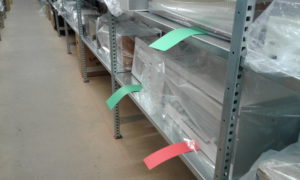
We are uniting our newly aquired collection of radio and broadcasting equipment with the collection we already have. This means we select what will go to a new storage space and what stays where it is.
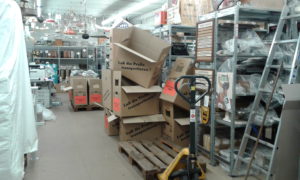
The selection is packed, correctly labeled and the objects and boxes are tracked in the database. Note: the “real work” is done by two young emerging museum professionals. I’m just the database and logistics consultant, box provider and forklift truck driver.
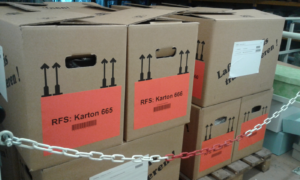
I’m often smiled upon or even challenged because I insist on documenting every move of an object, even if it’s “just” from one offsite storage to another or the museum. But just this month it happened that I accidentally found an object which was missing for quite a while and suspected to be stolen. It didn’t leave its box ever. If the location of this box was correctly documented, no one would have wasted his/her precious time searching it. Seems no one ever has the 30 seconds for changing a location, but always the hours for searching.
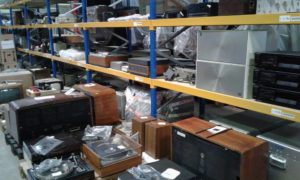
It seems useless to bring all the radios together in one place. In the end, what is a database there for? But having them together has a lot of advantages: similar object groups have similar storage needs and are endangered by the same kind of pests. Some radios are duplicates, bringing them together at one place will help us to decide if we really need a second or third one or if we just keep the best. Finally, it’s much easier to prepare loans and exhibitions on this topic if we don’t have to go to different locations for it.
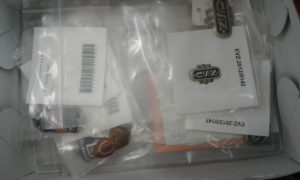
Our bicycle exhibition is open and doing fine, but there remained a lot of artifacts which were in the first selection but didn’t make it in the final selection. When putting them back to their original location I check the database entries and fill in what is missing. Measures, descriptions, conditions… some I sent off to our photographer to have their mugshots taken, so to speak. When preparing an exhibition there is never enough time to do this. You can only do it for the things that really go on display. By doing it now, future curators will have better data and more time for other duties.
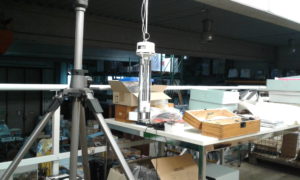
I checked the calibration of our dataloggers with an Assmann psychrometer.
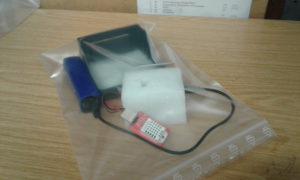
I also checked the reliability of our sensors against two different salt solutions. That way we know our climate data is reliable for the moment. We will check them again every 6 months.
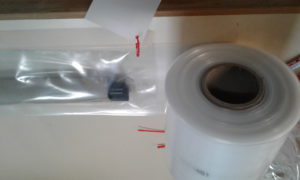
Together with the responsible curator I packed about 200 rolled maps. They always gave me headaches because I found no good way to store them. Then the curator took over a large collection of maps along with a wall rack designed to hang them. Because there are more hanging spaces than maps we can now store all our maps hanging.
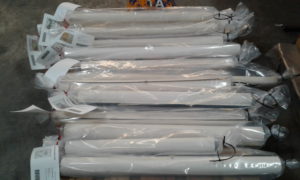
This means that we have to bag them all and apply a hanging system for those who have no hook.
Because we will hang them high above the ground this will create free space where they were stored previously, which is great. But I can’t claim this success, as it was the idea of the curator.
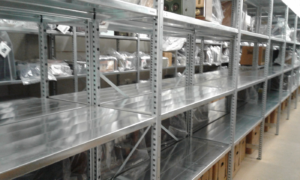
So, this month passed by. Of course there were many more things to do, each underwhelming in itself, but important in the big picture.
So, as you are all struggeling with your daily underwhelming tasks, never forget that you might not save the world, but doing major improvements in the way you eat an elephant: one piece at a time.
Keep up the good work!
Angela
I LOVE your remark….”It seems no one ever has the 30 seconds for changing a location, but always the hours for searching!” So True. That fits many other scenarios…do it right and completely the first time, if possible to save a lot of extra work later!
The satisfaction of completing each of these small steps! Sounds like a good month to me!
Great post, I love hearing about the day to day activities. Makes us feel less alone. I also keep like objects together as it makes it easier to search for missing items.